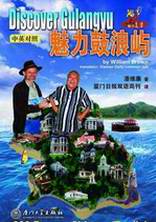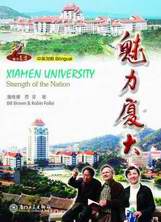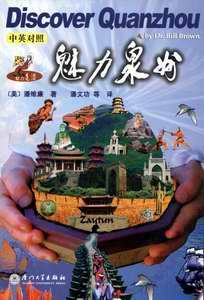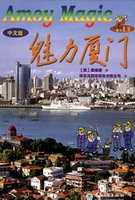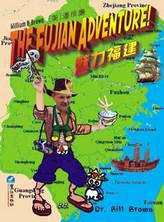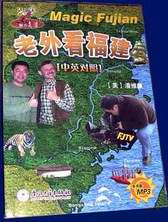![]() Click
to
Access
Click
to
Access
OUTSIDE China
![]() Click
to Access
Click
to Access
INSIDE
China ![]()
![]()
![]() Xiamen
Xiamen
![]() Gulangyu
Gulangyu
![]() Jimei
Jimei
![]() Tong'an
Tong'an
![]() Jinmen
Jinmen
![]() Zhangzhou
Zhangzhou
![]() Quanzhou
Quanzhou
![]() Wuyi
Wuyi
![]() Fuzhou
new!
Fuzhou
new!
![]() #1Fujian
Sites!
#1Fujian
Sites!
![]() Fujian
Foto Album
Fujian
Foto Album
![]() Books
on Fujian
Books
on Fujian
![]() Readers'Letters
Readers'Letters
![]() Ningde
Ningde
![]() Zhouning
Zhouning
![]() Longyan
Longyan
![]() Sanming
Sanming
![]() Putian
Putian
![]() Bridges
Bridges
![]() Travel
Info,
Travel
Info,
![]() Hakka
Roundhouses
Hakka
Roundhouses
![]() Travel
Agents
Travel
Agents
![]() Mosques
Mosques![]()
![]() Temples
Temples![]()
![]()
![]() Amoy
People!
Amoy
People! ![]()
![]() Darwin
Driving
Darwin
Driving ![]()
![]() Amoy
Tigers
Amoy
Tigers
![]() Chinese
Inventions
Chinese
Inventions
![]() Tibet
in 80 Days!
Tibet
in 80 Days!![]()
![]() Dethroned!
Dethroned!
![]()
![]() Misc.Writings
Misc.Writings
![]() Latest
News
Latest
News
![]() Lord
of Opium
Lord
of Opium
![]() Back
to Main Page
Back
to Main Page
![]() Order
Books
Order
Books![]() Xiamenguide
Forum
Xiamenguide
Forum 
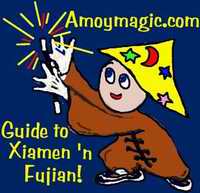
![]()
Fuzhou,
Ancient Capital of Fukien
City of Merchants, Adventurers, Scholars
Adapted from "Fujian Adventure",
Magic Fujian, and other books.
Fuzhou Links ![]() History
History
![]() Haunted
Nantai Island (Foreign Devils & Chinese Ghosts)
Haunted
Nantai Island (Foreign Devils & Chinese Ghosts)
![]() Pagoda
Anchorage
Pagoda
Anchorage
![]() Downtown
Downtown
![]() Cuisine
Cuisine
![]() Shopping
Shopping
![]() Secret
Yongtai
Secret
Yongtai ![]() Mosque
Mosque
![]() Hotels
Hotels
¡°Thence I passed eastward
to a certain city called Fuzhou¡The city is a
mighty fine one, and stands upon the sea¡Here be seen the greatest cocks
in the world.¡± (Friar Odoric¡ªFranciscan in China, 1323-1327)
Tall Ships and Tall Tales
Three magnificent tea clippers, vast sails billowing, raced out of Fuzhou¡¯s
Pagoda Anchorage on May 30th, 1866, in
a breakneck race to London. They didn¡¯t see each other again until September
6th ¡ª3 months and 15,700 miles later. The Taiping beat the Ariel by 30
minutes, and the Serica sailed in a few hours later!
Majestic tall ships plied the waters between Fuzhou, London, and New York,
trading in silk, tea, and opium. They were built for beauty as well as
for speed¡ªcopper bottoms, black topsides, gold or yellow trim, varnished
masts and spars, bleached teak decks, snow-white sails, and enough gleaming
brass trim to blind enraptured onlookers as the ships sailed out of the
jaws of the mighty Min River, which carries more water than the Yangtze--though
not all made it.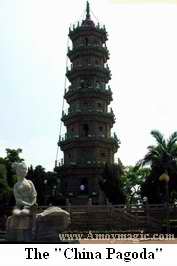
Between Pagoda Anchorage and the sea, the
Min surged through a narrow gorge that was so tight that old salts claimed
monkeys jumping from one side to the other got their tails caught in the
rigging. These were tall tales, for tall ships, but many a ship, like
the Oriental in 1853 and the Vision in 1857, sank in the mighty Min. No
one took the Min for granted¡ªespecially the Chinese, who were the greatest
ocean-going adventurers of the ancient world. About the end of 1431, prior
to his last voyage, the great mariner Zhenghe himself erected a table
near the mouth of the Min, in what is now Changle. With all modesty he
noted that his unparalleled expeditions had unified seas and continents,
and that all nations had become subjects of China, bearing precious gifts
to the Ming Emperor.
¡°The vessels which they navigate to Cathay be very big, and have upon
the ship¡¯s hull more than one hundred cabins, and with a fair wind they
carry ten sails¡¡± Friar Jordanus
Neolithic Fuzhou Fuzhou
was first settled by Neolithic tribes about 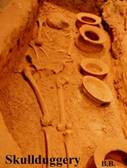 5,000
years ago. The first city walls were raised in 202 B.C. when it
became the capital city of Minyue. Fuzhou was named after Fu Mountain,
which Chinese say resembles the character Fu (¸£, Prosperity). If so, it¡¯s
sloppy calligraphy. I think that rumor was started by someone named Fu
Ling Yu.
5,000
years ago. The first city walls were raised in 202 B.C. when it
became the capital city of Minyue. Fuzhou was named after Fu Mountain,
which Chinese say resembles the character Fu (¸£, Prosperity). If so, it¡¯s
sloppy calligraphy. I think that rumor was started by someone named Fu
Ling Yu.
Ancient Economic Powerhouse
Fuzhou folk were trading overseas before most of China knew seas existed,
and the city was an international trading port by the Tang Dynasty (618-907
AD). Although Fuzhou was an economic powerhouse, her entrepreneurial
people balanced commerce with culture and education. The great Tang Dynasty
writer, Han Yu, said the cultural level of Fuzhou equaled that of China¡¯s
capital, Chang¡¯An. The city had several nationally famous academies, and
China¡¯s first public library, Chaojing Tower.
Revolutionists Fuzhou folks¡¯
fearlessness in blazing new trails, economically, politically, or culturally,
perhaps explains why the city was twice designated the temporary capital
of China, and in 1933 was looked upon as the ¡°Revolutionary Capital of
China.¡± Fuzhou was home to some of China¡¯s greatest shipbuilders, merchants,
poets, philosophers, and patriots, like Linze Xu. At least 850,000 overseas
Chinese claim Fuzhou as their hometown.
Fiery Folk The Mongols had their
hands full when Marco Polo wrote:
¡°Now this city of Fuzhou
is the key of the kingdom which is called Chonka¡and subject to the Great
Khan. And a large garrison is maintained there by that prince to keep
the kingdom in peace and subjection. For the city is one which is apt
to revolt on very slight provocation¡.¡±
Fuzhou folk were still not keen on foreign devils 550 years later, when
they forced their way in after the Opium War.
Maybe that¡¯s why the Chinese stuck the lot of them out on a haunted island¡
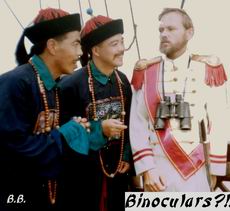
Nantai Island¡Foreign
Devils and Ghosts. The first
Opium War forced Fuzhou open as a Treaty Port¡ªat least on paper. But battleships
and lawyers didn¡¯t win the people¡¯s hearts, and the Laowai still had to
fight tooth and nail to get land for commerce and housing. I had a taste
of their poor reception when I played Admiral Elliott in a TV series.
(Like the modern binoculars? At least I persuaded them to ditch the telephone
and typewrite on my London desk!).
After opening the Canton consulate in July 1843, George Tradescant Lay
arrived in Fuzhou in July 1844. But Fuzhou folk didn¡¯t welcome him with
wide-open arms! He was forced off his ship at Pagoda
Island and made to go up river in a small boat. Fuzhou authorities
allocated him a house in a poor class neighborhood.. The house was built
of boards, over the river, which flooded twice a day. He was later moved
to another house which he complained, ¡®kept out neither sun nor rain.¡¯
Foreigners had opened Fuzhou¡¯s doors at gunpoint, and now they insisted
on living inside the city walls¡ªas if familiarity would breed camaraderie
rather than contempt. The Chinese, however, were ingenious in finding
reasons to keep the Laowai outside the gates. ¡°Tall buildings destroy
the fengshui,¡± was a favorite ploy.
Eventually the Chinese found a solution: put the foreign devils with the
 ghosts! The foreigners were allowed to build their settlement, with its
fine colonial mansions, consulates, and churches, upon an old burial ground
on Nantai Island, to the south. This made
it tough to keep servants, who were afraid of ghosts, but at least it
helped keep the rent down. ... Click
for Tour of Haunted Nantai Island.
ghosts! The foreigners were allowed to build their settlement, with its
fine colonial mansions, consulates, and churches, upon an old burial ground
on Nantai Island, to the south. This made
it tough to keep servants, who were afraid of ghosts, but at least it
helped keep the rent down. ... Click
for Tour of Haunted Nantai Island.
FUZHOU LINKS
![]() Fuzhou
History (birthplace of Chinese Maritime Industry)
Fuzhou
History (birthplace of Chinese Maritime Industry)
![]() Pagoda
Island (famous "China
Pagoda," Sino-French Battle, etc.)
Pagoda
Island (famous "China
Pagoda," Sino-French Battle, etc.)
![]() Foochow's
Haunted Nantai Island Tour (Includes old Consulates, Rotary
Club, haunted churches...)
Foochow's
Haunted Nantai Island Tour (Includes old Consulates, Rotary
Club, haunted churches...)
![]() Heart
of Fuzhou: 3 Wards & 7 Streets, Li Family House, Banyan City,
Yushan Hill and White Pagoda, Clay People, etc.
Heart
of Fuzhou: 3 Wards & 7 Streets, Li Family House, Banyan City,
Yushan Hill and White Pagoda, Clay People, etc.
![]() Qingjing
Mosque
Qingjing
Mosque
![]() Secret
Valley of Yongtai (Fujian's Best Kept Secret)
Secret
Valley of Yongtai (Fujian's Best Kept Secret)
![]() Fuzhou
Cuisine (Buddha Jumps the Wall Soup, Pounded Pork, Fish Balls)
Fuzhou
Cuisine (Buddha Jumps the Wall Soup, Pounded Pork, Fish Balls)
![]() Fuzhou
Shopping
Fuzhou
Shopping
Note: Fuzhou
was also spelled Foochow, Fuh-chau, Fuhchau, etc.
![]() Favorite
Fujian Sites
Favorite
Fujian Sites ![]() Fujian
Foto Album
Fujian
Foto Album ![]() Xiamen
Xiamen
![]() Gulangyu
Gulangyu
![]() Fujian
Guides
Fujian
Guides ![]() Quanzhou
Quanzhou
![]() Zhangzhou
Zhangzhou
![]() Longyan
Longyan
![]() Wuyi
Mtn
Wuyi
Mtn ![]() Ningde
Ningde
![]() Putian
Putian
![]() Sanming
Sanming
![]() Zhouning
Zhouning
![]() Taimu
Mtn.
Taimu
Mtn. ![]() Roundhouses
Roundhouses
![]() Bridges
Bridges
![]() Jiangxi
Jiangxi
![]() Guilin
Guilin
![]() Order
Books
Order
Books![]() Readers'
Letters
Travelogues
by Scott Ballantyne
Readers'
Letters
Travelogues
by Scott Ballantyne
Last Updated: May 2007
![]()
![]()
![]() FAQs
Questions?
FAQs
Questions?
![]() Real
Estate
Real
Estate
![]() Shopping
Shopping
![]() Maps
Maps
![]() Trains
Trains
![]() Busses
Busses
![]() Hotels
Hotels
![]() News
(CT)
News
(CT)
![]() Medical
& Dental
Medical
& Dental
![]() YMCA
Volunteer!
YMCA
Volunteer! ![]()
![]() XICF
Fellowship
XICF
Fellowship
![]() Churches
Churches
![]()
![]() Expat
Groups
Expat
Groups
![]() Maids
Maids
![]() Phone
#s
Phone
#s
![]()
![]() Xiamen
University
Xiamen
University
![]() XIS(Int'l
School)
XIS(Int'l
School)
![]() Study
Mandarin
Study
Mandarin
![]() CSP(China
Studies)
CSP(China
Studies)
![]() Library
Library
![]() Museums
Museums
![]() History
History
![]()
![]() Restaurants
Restaurants
![]() Asian
Asian
![]() Veggie
Veggie
![]() Junk
Food
Junk
Food
![]() Chinese
Chinese
![]() Italian
Italian
![]() International
International![]()
![]() Visas
4 aliens
Visas
4 aliens
![]()
![]() Massage!
Massage!
![]() Beaches
Beaches
![]() Fly
Kites
Fly
Kites
![]() Sports
Sports
![]() Boardwalk
Boardwalk
![]() Parks
Parks
![]() Pets
Pets
![]() Birdwatching
Birdwatching
![]() Kung
Fu
Kung
Fu ![]() Hiking
Hiking
![]() Music
Events
Music
Events
![]() Festival&Culture
Festival&Culture
![]() Humor&
Humor&![]() Fun
Fotos
Fun
Fotos![]()
![]()
![]() Doing
Business
Doing
Business
![]() Jobs!(teach/work)
Jobs!(teach/work)
![]() Hire
Workers
Hire
Workers
![]() Foreign
Companies
Foreign
Companies
![]() CIFIT
(Trade Fair)
CIFIT
(Trade Fair)
![]() MTS(Translation)
MTS(Translation)
![]()
Back to Top![]()
